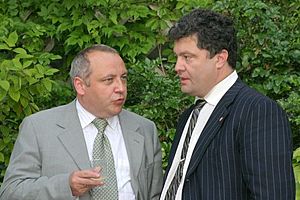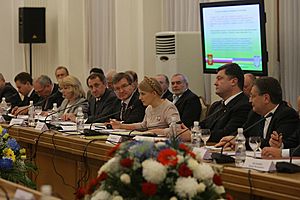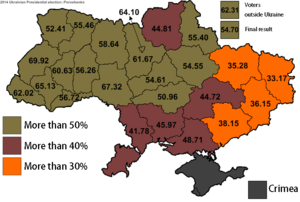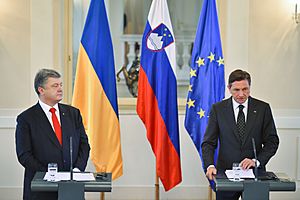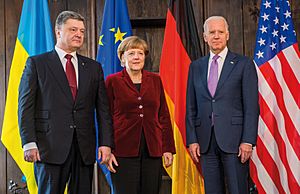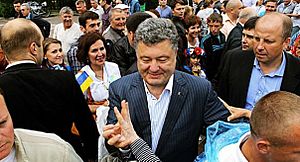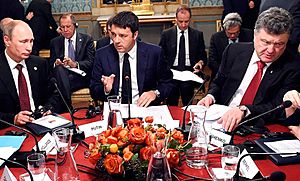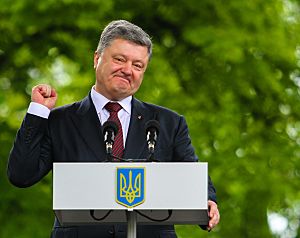Petro Poroshenko facts for kids
Quick facts for kids
Petro Poroshenko
|
|
|---|---|
|
Петро Порошенко
|
|
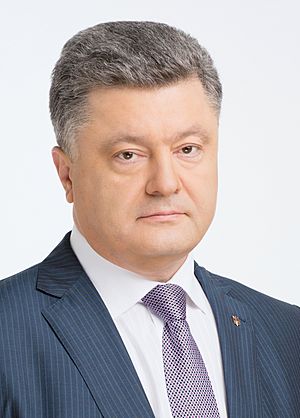
Official portrait, 2014
|
|
| 5th President of Ukraine | |
| In office 7 June 2014 – 20 May 2019 |
|
| Prime Minister | |
| Preceded by | Oleksandr Turchynov (acting) |
| Succeeded by | Volodymyr Zelenskyy |
| Minister of Trade and Economic Development | |
| In office 13 March 2012 – 4 December 2012 |
|
| Prime Minister | Mykola Azarov |
| Preceded by | Andriy Klyuyev |
| Succeeded by | Ihor Prasolov |
| Minister of Foreign Affairs | |
| In office 9 October 2009 – 11 March 2010 |
|
| Prime Minister |
|
| Preceded by | Volodymyr Khandohiy |
| Succeeded by | Kostyantyn Gryshchenko |
| Secretary of the National Security and Defense Council |
|
| In office 8 February 2005 – 8 September 2005 |
|
| President | Viktor Yushchenko |
| Preceded by | Volodymyr Radchenko |
| Succeeded by | Anatoliy Kinakh |
| People's Deputy of Ukraine | |
| Assumed office 29 August 2019 |
|
| Constituency | European Solidarity, No. 1 |
| In office 12 December 2012 – 3 June 2014 |
|
| Succeeded by | Oleksii Poroshenko |
| Constituency | Vinnytsia Oblast, No. 12 |
| In office 12 May 1998 – 15 June 2007 |
|
| Constituency |
|
| Personal details | |
| Born | 26 September 1965 Bolhrad, Ukrainian SSR, Soviet Union (now Bolhrad, Odesa Oblast, Ukraine) |
| Political party | European Solidarity (2019–present) |
| Other political affiliations |
|
| Spouse | |
| Children | 4, including Oleksii |
| Residences | Kozyn, Kyiv Oblast |
| Alma mater | Taras Shevchenko National University |
| Occupation | Businessman and politician |
| Signature |  |
| Military service | |
| Allegiance |
|
| Branch/service |
|
| Years of service |
|
| Rank | Major |
| Battles/wars | |
Petro Oleksiiovych Poroshenko (born 26 September 1965) is a Ukrainian politician who served as the fifth president of Ukraine from 2014 to 2019. Poroshenko has been nicknamed the "Chocolate King" because of his ownership of Roshen, the largest confectionery manufacturing operation in Ukraine. In March 2012, Forbes placed him on the Forbes list of billionaires at 1,153rd place, with US$1 billion.
In April 2024, Poroshenko announced his intention to participate in the upcoming Ukrainian presidential election.
On 12 February 2025, Poroshenko was sanctioned by Zelenskyy through the National Security and Defense Council of Ukraine on suspicion of “high treason”.
Contents
Early life and education
Petro Poroshenko was born on 26 September 1965 in Bolhrad, Ukraine. His father, Oleksiy Poroshenko (1936–2020), was an engineer and later government official who managed multiple factories in the Ukrainian SSR. Little is known about his mother, Yevhenia Serhiyivna Hryhorchuk (1937–2004), but a Ukrainian newspaper said she was an accountant, who taught at a vocational and technical school of accounting. Poroshenko spent his childhood and youth in Tighina (Moldavian Soviet Socialist Republic, now known as Bender and under de facto control of the unrecognized breakaway state Transnistria), where his father Oleksii was heading a machine building plant and where he learned Romanian.
In his youth, Poroshenko practiced judo and sambo, and was a Candidate for Master of Sport of the USSR.
In 1989, Poroshenko graduated from the Taras Shevchenko National University of Kyiv with a degree in economics.
In 1984, Poroshenko married a medical student, Maryna Perevedentseva (born 1962). Their first son, Oleksiy, was born in 1985 (his three other children were born in 2000 and 2001).
From 1989 to 1992, Poroshenko was an assistant at the university's international economic relations department. While still a student, he founded a legal advisory firm mediating the negotiation of contracts in foreign trade, later starting to supply cocoa beans to the Soviet chocolate industry.
Poroshenko's brother, Mykhailo, eight years his senior, died in a car crash in 1997.
Business career
In 1993, Poroshenko together with his father Oleksii created the UkrPromInvest Company. The company specialized in confectionery and automotive industries.
Between 1996 and 1998, UkrPromInvest acquired control over several state-owned confectionery enterprises which became part of the Roshen group, creating the largest confectionery manufacturing operation in Ukraine. Poroshenko's business empire also includes several car and bus factories, Kuznia na Rybalskomu shipyard, the 5 Kanal television channel, as well as other businesses in Ukraine.
According to Poroshenko (and Rothschild Wealth Management & Trust) since becoming President of Ukraine he has relinquished the management of his businesses, ultimately (in January 2016) to a blind trust.
Associated businesses
A number of businesses were once part of the Ukrprominvest [uk] which Poroshenko headed in 1993–1998. The investment group was dissolved in April 2012.
- Bogdan group (Poroshenko sold his share in connection with the collapse of its production after the financial crisis of 2007–2008 in 2009), centered in Cherkasy
- Roshen group
- 5 Kanal and Priamyi television channels (he denies property relations with Priamyi).
- Kuznia na Rybalskomu shipyard in Kyiv
- International Invest Bank, owned through a trust and along with Ihor Kononenko
- Ukrprominvest-Agro, an agrarian holding
- Zoria Podillia, an agrarian company near Haisyn, specializing in sugar production from sugar beets
- Podillia
- MAS-Agro
- Ahrofirma "Dniproahrolan"
- Ahrofirma "Ivankivtsi"
- Sevastopol Shipyard (lost in 2015 due to a corporate raid by the Russian occupational authorities in Crimea)
Early political career
Poroshenko first won a seat in the Verkhovna Rada (the Ukrainian Parliament) in 1998 for the 12th single-mandate constituency. He was initially a member of the United Social Democratic Party of Ukraine (SDPU), the party led by Viktor Medvedchuk and loyal to president Leonid Kuchma at the time. Poroshenko left SDPU(o) in 2000 to create an independent left-of-center faction and then a party, naming it Party of Ukraine's Solidarity (PSU). In 2001 Poroshenko was instrumental in creating the Party of Regions, also loyal to Kuchma; the Party of Ukraine's Solidarity having merged into the Party of Regions, Poroshenko launched a new party with a similar name, the party "Solidarity.
Secretary of the National Security and Defense Council
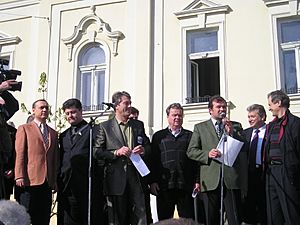
In December 2001, Poroshenko broke ranks with Kuchma supporters to become campaign chief of Viktor Yushchenko's Our Ukraine Bloc opposition faction. After parliamentary elections in March 2002 in which Our Ukraine won the biggest share of the popular vote and Poroshenko won a seat in parliament, Poroshenko served as head of the parliamentary budget committee, where he was accused of "misplacing ₴47 million" (US$8.9 million). As a consequence of Poroshenko's Our Ukraine Bloc membership tax inspectors launched an attack on his business. Despite great difficulties, UkrPromInvest managed to survive until Yushchenko became President of Ukraine in 2005.
Poroshenko was considered a close confidant of Yushchenko, who is the godfather of Poroshenko's daughters. Poroshenko was likely the wealthiest oligarch among Yushchenko supporters, and was often named as one of the main financial backers of Our Ukraine and the Orange Revolution. After Yushchenko won the presidential elections in 2004, Poroshenko was appointed Secretary of the National Security and Defense Council.
In September 2005, highly publicized mutual allegations of corruption erupted between Poroshenko and Prime Minister Yulia Tymoshenko involving the privatizations of state-owned firms. Poroshenko, for example, was accused of defending the interests of Viktor Pinchuk, who had acquired state firm Nikopol Ferroalloy for $80 million, independently valued at $1 billion.
In response to the allegations, Yushchenko dismissed his entire cabinet of ministers, including Poroshenko and Tymoshenko. State prosecutors dismissed an abuse of power investigation against Poroshenko the following month, immediately after Yushchenko dismissed Sviatoslav Piskun, General Prosecutor of Ukraine. Piskun claimed that he was sacked because he refused to institute criminal proceedings against Tymoshenko and refused to drop proceedings against Poroshenko.
In the March 2006 parliamentary election, Poroshenko was re-elected to the Ukrainian parliament with the support of Our Ukraine electoral bloc. He chaired the parliamentary Committee on Finance and Banking. Allegedly, since Poroshenko claimed the post of Chairman of the Ukrainian Parliament for himself, the Socialist Party of Ukraine chose to be part of the Alliance of National Unity because it was promised that their party leader, Oleksandr Moroz, would be elected chairman if the coalition were formed. This left Poroshenko's Our Ukraine and their ally Yulia Tymoshenko Bloc out of the Government.
Poroshenko did not run in the September 2007 parliamentary election. He started heading the Council of Ukraine's National Bank in February 2007. Between 1999 and 2012 he was a board member of the National Bank of Ukraine.
Foreign Minister and Minister of Trade
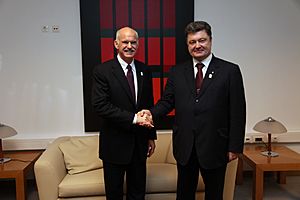
Ukrainian President Yushchenko nominated Poroshenko for Foreign Minister on 7 October 2009. Poroshenko was appointed by the Verkhovna Rada (Ukraine's parliament) on 9 October 2009. On 12 October 2009, President Yushchenko re-appointed Poroshenko to the National Security and Defense Council.
Poroshenko supported Ukrainian NATO-membership, and said NATO membership should not be a goal in itself. Although Poroshenko was dismissed as foreign minister on 11 March 2010, President Viktor Yanukovych expressed hope for further cooperation with him.
In late February 2012, Poroshenko was named as the new Minister of Trade and Economic Development in the Azarov Government; on 9 March 2012, President Yanukovych stated he wanted Poroshenko to work in the government in the post of economic development and trade minister. On 23 March 2012, Poroshenko was appointed economic development and trade minister of Ukraine by Yanukovych. The same month he stepped down as head of the Council of Ukraine's National Bank.
Poroshenko claims that he became Minister of Trade and Economic Development to help bring Ukraine closer to the EU and get Yulia Tymoshenko released from prison. After he took the post, tax inspectors launched an attack on his business.
Return to parliament
Poroshenko returned to the Verkhovna Rada (parliament) after the 2012 Ukrainian parliamentary election after winning (with more than 70%) as an independent candidate in single-member district number 12 (first-past-the-post wins a parliamentary seat) located in Vinnytsia Oblast. He did not enter any faction in parliament and became member of the committee on European Integration. Poroshenko's father Oleksii did intend to take part in the elections too in single-member district number 16 (also located in Vinnytsia Oblast), but withdrew his candidacy for health reasons. In mid-February 2013, Poroshenko hinted he would run for Mayor of Kyiv in the 2013 Kyiv mayoral election.
In 2013, the registration certificate of Solidarity was cancelled because it had not participated in any election for more than 10 years. Poroshenko then launched and became leader of the National Alliance of freedom and Ukrainian patriotism "OFFENSIVE" (NASTUP), which was renamed "All-Ukrainian Union Solidarity" (BOS).
2014 Ukrainian revolution

Poroshenko actively and financially supported the Euromaidan protests between November 2013 and February 2014, leading to an upsurge in his popularity, although he did not participate in negotiations between then President Yanukovych and the Euromaidan parliamentary opposition parties Batkivshchyna, Svoboda and UDAR.
In an interview with Lally Weymouth, Poroshenko said: "From the beginning, I was one of the organizers of the Maidan. My television channel — Channel 5 — played a tremendously important role. ... At that time, Channel 5 started to broadcast, there were just 2,000 people on the Maidan. But during the night, people went by foot — seven, eight, nine, 10 kilometers — understanding this is a fight for Ukrainian freedom and democracy. In four hours, almost 30,000 people were there." The BBC reported, "Mr Poroshenko owns 5 Kanal TV, the most popular news channel in Ukraine, which showed clear pro-opposition sympathies during the months of political crisis in Kiev."
Poroshenko refused to join the Yatseniuk Government (although he introduced his colleague Volodymyr Groysman, the mayor of Vinnytsia, into it), nor did he join any of the two newly created parliamentary factions Economic Development and Sovereign European Ukraine.
2014 presidential campaign
Following the 2014 Ukrainian revolution and the resulting removal of Viktor Yanukovych from the office of President of Ukraine, new presidential elections were scheduled to take place on 25 May 2014. In pre-election polls from March 2014, Poroshenko garnered the most support of all the prospective candidates, with one poll conducted by SOCIS giving him a rating of over 40%. On 29 March he stated that he would run for president; at the same time Vitali Klitschko left the presidential contest, choosing to support Poroshenko's bid.
On 2 April, Poroshenko stated, "If I am elected, I will be honest and sell the Roshen Group." He also said in early April that the level of popular support for the idea of Ukraine's joining NATO was too small to put on the agenda "so as not to ruin the country." He also vowed not to sell his 5 Kanal television channel. On 14 April, Poroshenko publicly endorsed the campaign of Jarosław Gowin's party Poland Together of neighboring Poland in that year's elections to the European Parliament, thanking Gowin's party colleague Paweł Kowal for supporting Ukraine.
On 29 May, the Central Election Commission of Ukraine announced that Poroshenko had won the presidential election, getting 54.7% of the votes.
Presidency (2014–2019)
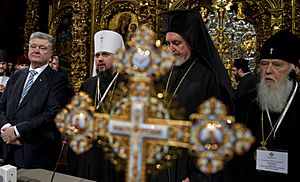
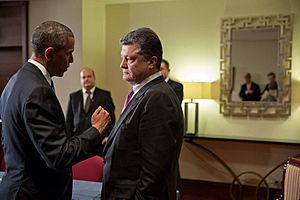




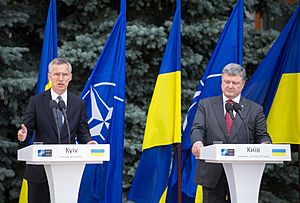
When it became clear he had won the election on election day evening (on 25 May 2014) Poroshenko announced his "first presidential trip will be to Donbas", where armed pro-Russian rebels had declared the separatist republics Donetsk People's Republic and Luhansk People's Republic and control part of the region. Poroshenko also vowed to continue the military operations by the Ukrainian government forces to end the armed insurgency claiming: "The anti-terrorist operation cannot and should not last two or three months. It should and will last hours."
As president-elect, Poroshenko promised to return Crimea, which was annexed by Russia in March 2014. He also vowed to hold new parliamentary elections in 2014.
Inauguration
Poroshenko was inaugurated in the Verkhovna Rada (parliament) on 7 June 2014. In his inaugural address he stressed that Ukraine would not give up Crimea and stressed the unity of Ukraine. He promised an amnesty "for those who do not have blood on their hands" to the separatist and pro-Russia insurgents of the 2014 pro-Russian conflict in Ukraine and to the Ukrainian nationalist groups that oppose them, but added: "Talking to gangsters and killers is not our path". He also called for early regional elections in Eastern Ukraine.
Poroshenko stated that he would sign the economic part of the Ukraine–European Union Association Agreement and that this was the first step towards full Ukrainian EU Membership. During the speech, he stated he saw "Ukrainian as the only state language" but also spoke of the "guarantees [of] the unhindered development of Russian and all the other languages". Part of the speech was in Russian.
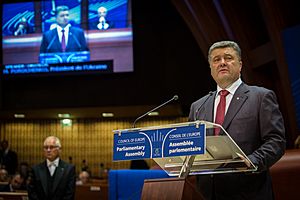
Domestic policy
Peace plan for Eastern Ukraine
At the time of his inauguration, armed pro-Russian rebels had declared the independence of the Donetsk People's Republic and Luhansk People's Republic and controlled a large part of Donbas, but were largely considered to be illegitimate by the international community. After the inauguration, Poroshenko launched a "peace" plan envisioned to garner the recognition of the presidential elections in Ukraine by Russia, consisting of a cease-fire with the separatists and establishment of a humanitarian corridor for civilians ("who are not involved in the conflict"). Poroshenko warned that he had a "Plan B" if the initial peace plan was rejected.
Decentralization of power
In mid-June Poroshenko started the process of amending Ukraine's constitution to achieve Ukraine's administrative decentralization. According to Poroshenko (on 16 June 2014) this was "a key element of the peace plan". In his draft constitutional amendments of June 2014 proposed changing the administrative divisions of Ukraine, which should include regions (replacing the current oblasts), districts and "hromadas" (united territorial communities).
In these amendments he proposed that "Village, city, district and regional administrations will be able to determine the status of the Russian language and other national minority languages of Ukraine in accordance with the procedure established by the law and within the borders of their administrative and territorial units". He proposed that Ukrainian remained the only state language of Ukraine.
Poroshenko proposed to create the post of presidential representatives who would supervise the enforcement of the Ukrainian constitution and laws and the observation of human rights and freedoms in the administrative divisions.
He repeatedly spoke out against federalization, and did not seek to increase his presidential powers.
The 1 July 2015 decentralization draft law gave local authorities the right to oversee how their tax revenues are spent. The draft law did not give an autonomous status to Donbas, as demanded by the pro-Russian rebels there, but gave the region partial self-rule for three years.
Nuclear weapons
On 13 December 2014, Poroshenko stated that he did not want Ukraine to become a nuclear power again.
Decommunization
On 15 May 2015, Poroshenko signed a bill into law that started a six months period for the removal of communist monuments and the mandatory renaming of streets and other public places and settlements with a name related to Communism.
Language
In 2016, a new rule came into force requiring Ukraine's radio stations to play a quota of Ukrainian-language songs each day. The law also requires TV and radio broadcasters to ensure 60% of programs such as news and analysis are in Ukrainian.
On 25 September 2017, a new law on education was signed by President Poroshenko (draft approved by Rada on 5 September 2017) which says that the Ukrainian language is the language of education at all levels except for one or more subjects that are allowed to be taught in two or more languages, namely English or one of the other official languages of the European Union. The law stipulates a 3-year transitional period to come in full effect. In February 2018, this period was extended until 2023.
The law was condemned by PACE that called it "a major impediment to the teaching of national minorities". The law also faced criticism from officials in Hungary, Romania and Russia.
On 15 May 2019, Poroshenko signed the law "On provision of the functioning of the Ukrainian language as the State language".
In the 2019 Ukrainian presidential election, Poroshenko received 24.5% of the second round votes, and was defeated by Volodymyr Zelenskyy.
Personal life
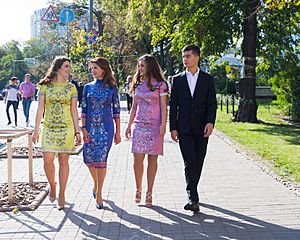
Poroshenko has been married to Maryna Perevedentseva, a cardiologist, since 1984. The couple have four children together: Oleksii (born 1985), twins Yevheniia and Oleksandra (born 2000) and Mykhailo (born 2001). Oleksii was a representative in the regional parliament of Vinnytsia Oblast. In November 2014, he became a People's Deputy of Ukraine with 64.04% of votes in constituency No.12. Poroshenko became a grandfather on the day of his presidential inauguration, 7 June 2014.
His wife is actively involved in the activities of the Petro Poroshenko Charity Foundation.
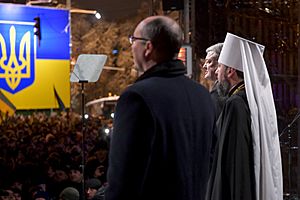
Poroshenko is a member of the Ukrainian Orthodox Church. In addition to his native language, Ukrainian, Poroshenko is fluent in Russian, English, and Romanian.
Poroshenko is diabetic.
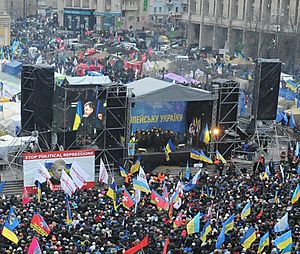
Awards
 Ukraine: Order of Merit
Ukraine: Order of Merit Moldova: Order of the Republic
Moldova: Order of the Republic Poland: Order of the White Eagle
Poland: Order of the White Eagle Spain: Order of Civil Merit
Spain: Order of Civil Merit Ukraine: Medal of winner of Ukraine State Prize in Science and Technology
Ukraine: Medal of winner of Ukraine State Prize in Science and Technology Saudi Arabia: Order of King Abdulaziz
Saudi Arabia: Order of King Abdulaziz Lithuania: Grand Cross of the Order of Vytautas the Great
Lithuania: Grand Cross of the Order of Vytautas the Great Ecumenical Patriarchate of Constantinople: cross of Panagia Pammakaristos (5 January 2019)
Ecumenical Patriarchate of Constantinople: cross of Panagia Pammakaristos (5 January 2019)- Orthodox Church of Ukraine: Order of St. Andrew Pervozvannyi (Pervozvannyi meaning "The First-Called")
See also
 In Spanish: Petró Poroshenko para niños
In Spanish: Petró Poroshenko para niños


